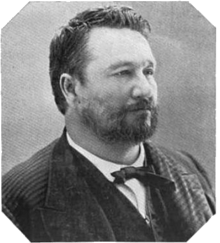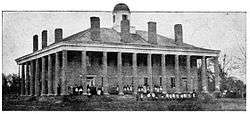Joel B. Mayes

Joel Bryan Mayes[1] (Tsa-wa Gak-ski, in Cherokee)[2] (1833 – 1891) was Principal Chief of the Cherokee Nation.[3]
Early life and education
He was born in present-day Bartow County, Georgia[4] on October 2, 1833, of mixed Cherokee and white ancestry.[5] He attended college at the Cherokee Male Seminary[6] and was editor of a small weekly newspaper there called the Sequoyah Memorial, whose motto was "Truth, Justice, Freedom of Speech and Cherokee Improvement."[7] He graduated in 1856.[8]
In 1857 he married Martha Candy, who died three years later. She had been an 1856 graduate of the Cherokee Female Seminary.[9]
Military service

He served as a major in the Confederate Army, where he held the positions of quartermaster and paymaster, until the end of the war.[11] During the war, his family and other Confederate Cherokee took refuge in Rusk and Smith counties of east Texas.[12] During this time, he married Martha McNair in 1863. She died three years later, just as the first Mrs. Mayes had.[13]
Postwar Life
After the war ended, Joel B. Mayes, became a successful farmer along the Grand River.[14]
In 1873 he married Mary Delilah Vann, who outlived him.[15]
Political career
In 1868 he became a court clerk, and upon completing one term he was elected judge of the Northern Circuit of the Cherokee Nation. He served in this office for five years before being appointed secretary of the Commission on Citizenship. While still secretary of the Commission on Citizenship, he became clerk of the National Council. He was then named an associate justice of the Cherokee Supreme Court, which he served for one year before being elected Chief Justice by the National Council.[16]
Cherokee Chief
He was named Principal Chief of the Cherokee Nation after a disputed election in 1887. It was during his administration that the Cherokee Outlet sale was negotiated. He was re-elected to a second term, but died shortly thereafter, on December 14, 1891.[17]
| Preceded by Dennis Bushyhead |
Principal Chief of the Cherokee Nation 1887–1891 |
Succeeded by C. J. Harris |
References
- ↑ Starr, Emmet. History of the Cherokee Indians and Their Legends and Folk Lore. Oklahoma City: The Warden Company, 1921. Page 263.
- ↑ Powell, J. W. Nineteenth Annual Report of the Bureau of American Ethnology. Washington: Government Printing Office, 1900. Page 536.
- ↑ Starr, Emmet. History of the Cherokee Indians and Their Legends and Folk Lore. Oklahoma City: The Warden Company, 1921. Page 263.
- ↑ United States Census Bureau. The Five Civilized Tribes. Washington D. C.: United States Census Printing Office, 1894. Page 42.
- ↑ United States Census Bureau. The Five Civilized Tribes. Washington D. C.: United States Census Printing Office, 1894. Page 42.
- ↑ United States Census Bureau. The Five Civilized Tribes. Washington D. C.: United States Census Printing Office, 1894. Page 42.
- ↑ Works Project Administration. Oklahoma: A Guide to the Sooner State. Norman: University of Oklahoma Press, 1941. Page 76.
- ↑ United States Census Bureau. The Five Civilized Tribes. Washington D. C.: United States Census Printing Office, 1894. Page 42.
- ↑ United States Census Bureau. The Five Civilized Tribes. Washington D. C.: United States Census Printing Office, 1894. Page 42.
- ↑ United States Census Bureau. The Five Civilized Tribes. Washington D. C.: United States Census Printing Office, 1894. Page 42.
- ↑ United States Census Bureau. The Five Civilized Tribes. Washington D. C.: United States Census Printing Office, 1894. Page 42.
- ↑ Oklahoma Historical Society, John Bartlett Meserve, Chronicles of Oklahoma, Vol. 15, no.1, March 1937, pg.57-59. Read account at http://digital.library.okstate.edu/Chronicles/v015/v015p056.html. Accessed on 12/21/12.
- ↑ United States Census Bureau. The Five Civilized Tribes. Washington D. C.: United States Census Printing Office, 1894. Page 42.
- ↑ United States Census Bureau. The Five Civilized Tribes. Washington D. C.: United States Census Printing Office, 1894. Page 42.
- ↑ United States Census Bureau. The Five Civilized Tribes. Washington D. C.: United States Census Printing Office, 1894. Page 42.
- ↑ United States Census Bureau. The Five Civilized Tribes. Washington D. C.: United States Census Printing Office, 1894. Page 42.
- ↑ Starr, Emmet. History of the Cherokee Indians and Their Legends and Folk Lore. Oklahoma City: The Warden Company, 1921. Page 263.
External links
| Wikisource has the text of a 1900 Appletons' Cyclopædia of American Biography article about Joel B. Mayes. |
|